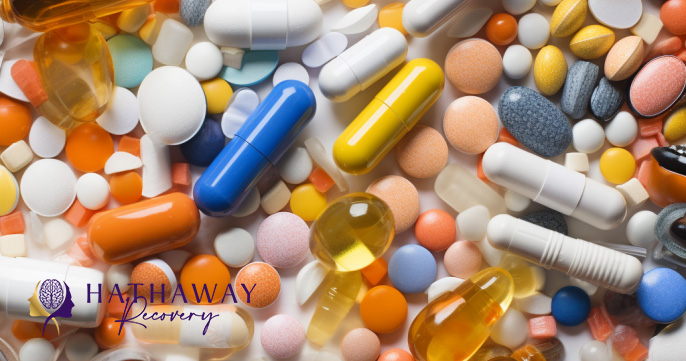Prescription drugs are essential in modern medicine, effectively treating many physical and mental health conditions. They offer countless individuals relief, healing, and improved quality of life. However, not all prescriptions are used responsibly despite their potential for good.
Prescription drug misuse arises when individuals deviate from their prescribed usage, whether by increasing the dosage, taking someone else’s medication, or abusing the prescription for recreational purposes. This article explores the prevalence of prescription drug misuse, its consequences, the types of prescription drugs most susceptible to misuse, risk factors, and the available treatment options.

Prevalence of Prescription Drug Misuse
In 2020, the United States witnessed a staggering statistic: more than 16 million Americans aged 12 and older misused prescription medications. This alarming number sheds light on the extent of this issue and underscores the urgency of addressing it. Unfortunately, prescription drug misuse can lead to severe and potentially life-threatening consequences.
Understanding Prescription Drugs
Prescription drugs encompass many medications healthcare professionals prescribe to address physical and mental health conditions. When used correctly, these drugs can be incredibly beneficial, providing relief and improved well-being. However, misuse can lead to addiction, health problems, or even overdose.
Categories of Misused Prescription Drugs:
Certain prescription drugs are more prone to misuse, with opioids, CNS depressants, and stimulants topping the list.
Opioids:
Opioids, commonly known as painkillers, are prescribed to manage severe and chronic pain. They bind to specific receptors in the brain, disrupt pain signals, and increase dopamine activity, which plays a role in reward and reinforcement behaviors. Side effects may include constipation, slowed breathing, and slurred speech.
CNS Depressants:
Central Nervous System (CNS) depressants, including sedative-hypnotic drugs and insomnia medications, treat anxiety, sleep disorders, seizures, and muscle spasms. They interact with gamma-aminobutyric acid (GABA) receptors, reducing anxiety, promoting sleep, and inducing sedation. Side effects can range from confusion to uncontrolled eye movements.
Stimulants:
Stimulants are prescribed to manage conditions like ADHD, narcolepsy, and obesity. They affect neurotransmitters such as norepinephrine and dopamine, impacting arousal, alertness, and reward pathways. Side effects may include increased heart rate, blood pressure, and hyperactivity.

Recognizing Abuse of Prescription Drugs
Identifying problematic prescription drug misuse can be challenging. The display of side effects alone does not necessarily indicate abuse. To diagnose a Substance Use Disorder (SUD), healthcare professionals assess specific criteria, requiring at least two of the following:
- Taking the substance in higher doses or for longer than intended.
- Unsuccessful attempts to cut down or quit.
- Significant time spent obtaining, using, or recovering from the substance.
- Cravings for the substance.
- Impaired functioning at work or school.
- Continued use despite relationship problems.
- Giving up important activities due to substance use.
- Use despite physical or mental health decline.
- Developing tolerance.
- Experiencing withdrawal symptoms.
It’s essential to note that the last two criteria are not applied to individuals taking prescription medications under medical supervision.
Risks and Consequences of Prescription Drugs Abuse
Misusing prescription drugs can lead to severe consequences, including addiction, overdose, and death. It can impair judgment, increase risky behaviors, such as unprotected sex, and contribute to vehicle accidents. High doses or improper administration can amplify side effects and heighten the risk of addiction.
Factors Contributing to Prescription Drug Abuse
Several factors can increase the risk of prescription drug abuse, including gender, high doses, underlying physical or mental health conditions, and prior history of substance misuse. Age also plays a role, with older adults and young adults at higher risk. Prolonged use can lead to dependence and addiction.
Treatment for Prescription Drug Abuse
Treatment options are available for individuals struggling with prescription drug abuse. Effective treatment considers the specific drug involved and the individual’s unique needs. Components may include:
Detox: Medically supervised detoxification helps individuals safely withdraw from substances while managing withdrawal symptoms.
Inpatient Treatment: This involves staying at a treatment facility, receiving intensive counseling, psychiatric care, education, and, if needed, medication to address underlying issues and develop coping strategies.
Outpatient Treatment: Similar to inpatient care it allows individuals to maintain their daily routines while attending scheduled therapy sessions.
Behavioral Therapy: Cognitive behavioral therapy (CBT) is often used to modify thoughts and behaviors, improve coping skills, reduce the risk of relapse, and enhance relationships.
Medication: FDA-approved medications may be used, especially in cases of opioid use, to manage cravings and reduce relapse risk.

If you or a loved one is struggling with prescription drug misuse, seeking treatment is crucial to regain control of your life and health. Understanding the prevalence, risks, and available treatment options can be the first step toward a healthier, drug-free future.
If you or someone you care about has an addiction, you can seek professional help. Research shows that rehab can be beneficial in helping people to stay sober.
Hathaway Recovery offers a tailored treatment program incorporating evidence-based treatments like experiential and behavioral therapies. Our holistic healing program can help you grow as a person and make a fresh start in your life.
We are committed to your privacy and comfort. You will feel completely relaxed in our state-of-the-art luxury facilities. The professional and compassionate staff at the Hathaway Recovery Center are always available to assist you.
The center provides private rooms, personalized attention, and treatment plans. Our staff includes the best specialists. Our mission is to Renew and Rebuild Lives.
For any questions, call the Admissions Department at 909-971-3333.
It is entirely confidential.
Don’t miss the chance to make a positive difference in your life.
- Individual counseling
- Group counseling
- Family Drug Education
- Relapse Prevention Therapy
- Counseling for grieving






